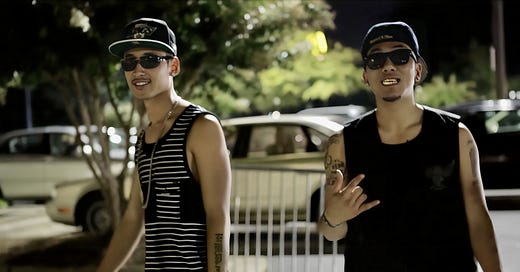A-Town Boyz
An interesting but incomplete documentary about a sons of immigrant Asian families who become assimilated into gang culture as they chase rapper dreams.
First up let me admit my cultural bias: I have never been a big fan of the rap music genre, especially the “gangsta” style associated with thug life. It spread across the U.S. starting in the late 1980s and was assimilated into mainstream culture, with white kids from the suburbs addressing each other with the N-word, playing the “Grand Theft Auto” video games and dressing with gold chains and blinged-out teeth.
A lot of those kids were posers, but some were not. They took the American culture they were presented with — one of drugs, hyper-masculine confrontations, guns, subservient women — at face value and thought that’s what being a man is all about.
It’s led to a lot of the problems we face as a society today, especially with men without jobs, out committing crimes and/or fathering children they are not prepared to parent.
“A-Town Boyz” is a documentary that looks at the sons of Asian immigrant families in Atlanta who fell into this trap. It chiefly follows Harrison “Vickz” Kim and Jamy “Bizzy” Long, two skinny kids who aspire to be rappers and represent that lifestyle. In their cases they become embroiled in Asian gangs and spend some hard time in prison in between occasional musical gigs.
As documentary subjects, both are hard to relate to. They aren’t particularly articulate or even interesting. Their raps are the usual gangsta stuff about getting respect, getting girls, getting money and showing everybody who they really are. Problem is, who they really are is a pair of alienated youngsters with ambitions far bigger than the talent and work ethic required to achieve them.
A secondary figure is “Uncle” Eugene Chung, who came up in the Italian mob of Brooklyn and became a central figure in the Asian gangs in Atlanta. He talks a lot about trying to go straight, get out of drugs, start some legitimate businesses, and so on. There’s even a sequence about him producing an R&B harmony quartet. But he keeps running back to what he knows, and always seems to have an eye over his shoulder for rivals or law enforcement.
Directed by Eunice Lau, “Boyz” was actually filmed around 2010-2012, but is just now being released. A coda at the end brings us up to date as far as 2013, after all three have served prison time. I would love to know the circumstances of why it took a decade to edit this documentary, or what the three men are up to today.
As it is, the film feels like an incomplete snapshot of a particular place and time. I’m not giving away by saying that Bizzy and Vickz’ musical dreams don’t take them very far. My guess is Lau hoped they would become major rappers and this could be the chronicle of their difficult rise.
Instead, they remain stuck at the fringes of the industry, mere pretenders who’ll never make it. We see Vickz performing his “comeback concert” to a cheap rented hall with maybe 20 people in attendance.
The most interesting parts of the movie are about their identity as Asians trying to fit into a rap culture that is most Black and brown. They are dismissed as outsiders or faux whites, which prompts them to start up their own gangs and music industry infrastructure.
Their big chance for rapping comes with a gig at the Velvet Room, a major outlet for rap and hip-hop acts in Atlanta. Things go sideways from what they were expecting, in a confusing sequence having something to do with who’s paying for the bottle service. (Again, club culture is not my thing so I needed more explanation.)
We get interviews with girlfriends and parents, who seem incapable of understanding why these young men have drifted into the lives they have. It’s clear they are a combination of victims and enablers, going along to get along — and now finding themselves trying to relate to men who are wholly alien to them.
There are some interesting things going on in in “Boyz,” but in the end it feels incomplete and truncated — the start of a good story lacking a proper ending. I may not be able to relate to these men’s experiences, but the best documentaries draw you in to a community that may be strange or even off-putting, and make you feel like you understand why people want to belong to it. I didn’t feel that here.




